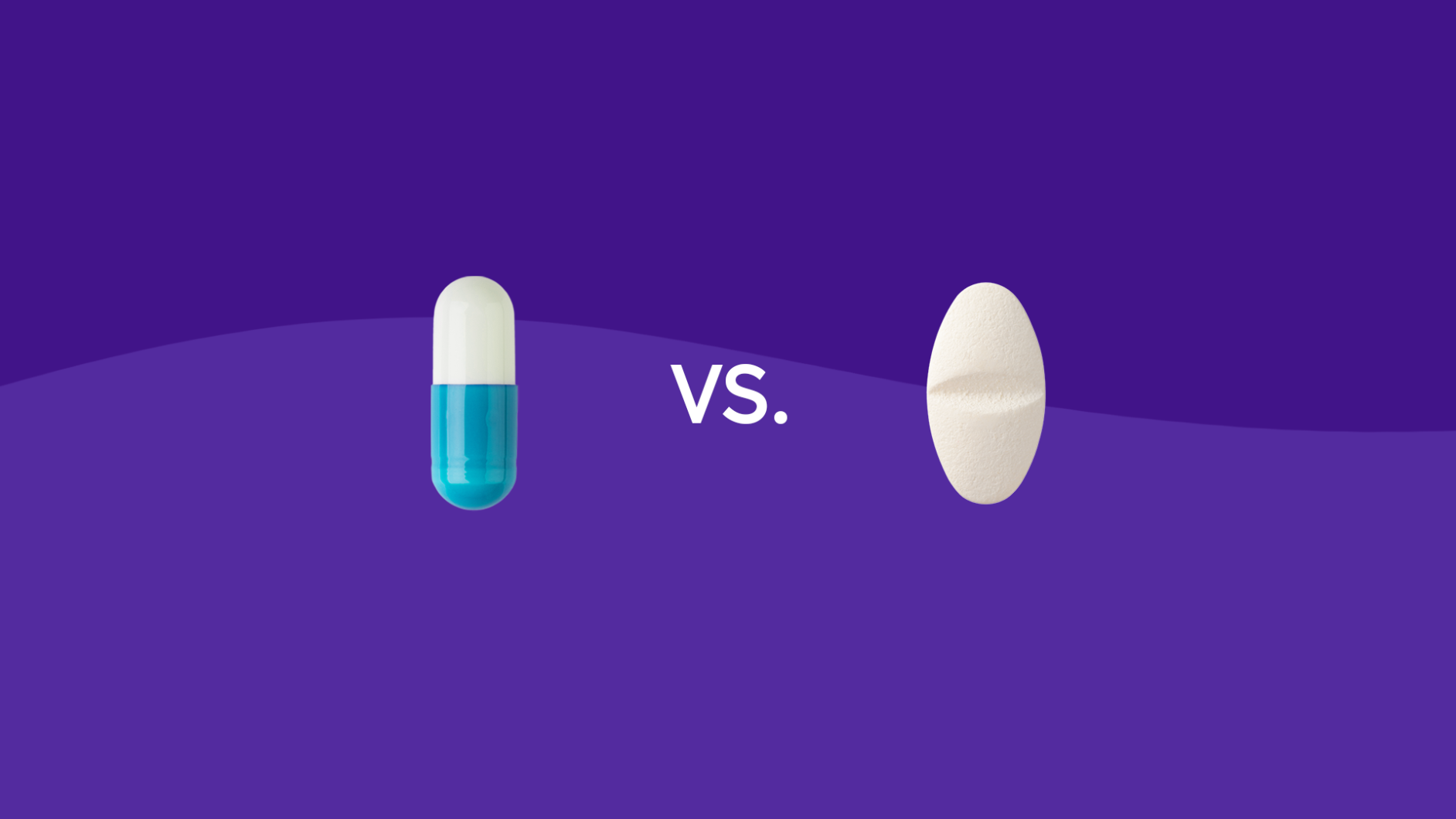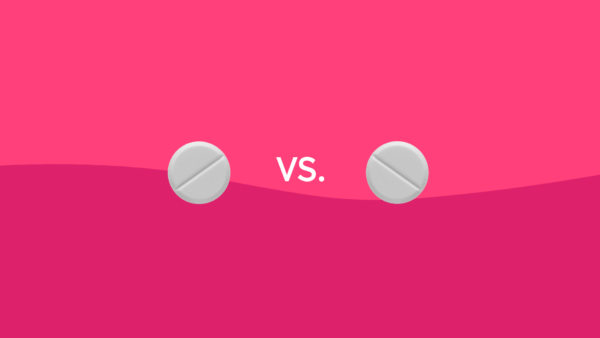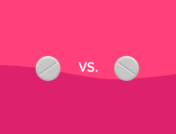Drug overview & main differences | Conditions treated | Efficacy | Insurance coverage and cost comparison | Side effects | Drug interactions | Warnings | FAQ
Attention deficit hyperactivity disorder (ADHD) affects 6.1 million lives in the United States. Diagnosing patients with ADHD has many steps. Patients may exhibit symptoms such as not listening when spoken to directly, failing to get organized to complete tasks or forgetfulness in daily activities. Patients with ADHD may need special accommodations in settings such as the classroom in order to successfully complete their work. Only a physician can diagnose ADHD, but once a diagnosis is made, there are treatment options to help these patients realize a higher quality of functioning in daily activities.
One of the most common types of treatments for ADHD is a class of medications known as central nervous system (CNS) stimulants. Vyvanse (lisdexamfetamine) and Ritalin (methylphenidate) are two medications within this class. Other well-known stimulants include Adderall/Adderall XR (amphetamine salts), Concerta (methylphenidate extended-release), Daytrana (methylphenidate), and Focalin/Focalin XR (dexmethylphenidate). There are non-stimulant treatment options for ADHD. These include Strattera (atomoxetine) and Intuniv ER (guanfacine).
What are the main differences between Vyvanse and Ritalin?
Vyvanse (What is Vyvanse?) is a central nervous system stimulant used in the treatment of ADHD and binge-eating disorder. The exact mechanism as to how Vyvanse treats these disorders is not known. Vyvanse is converted to its active metabolite, dextroamphetamine. Amphetamines stimulate the release of catecholamines, such as norepinephrine and dopamine, into the neuron synapse. We know these neurotransmitters play a critical role in mood, affect, and focus.
The Drug Enforcement Agency (DEA) deems Vyvanse a schedule II narcotic drug. This is due to its high abuse potential, and therefore there may be restrictions and guidelines for obtaining Vyvanse that differ by state. Vyvanse is an oral capsule available in 10 mg, 20 mg, 30 mg, 40 mg, 50 mg, 60 mg, and 70 mg. Vyvanse is also available in a chewable tablet in the same strengths as the capsule formulation.
Ritalin (What is Ritalin?) is also a central nervous system stimulant used in the treatment of ADHD and narcolepsy. Its exact mechanism is also not fully understood. Ritalin is a more mild CNS stimulant. Rather than causing the release of catecholamines, it blocks the reuptake of those neurotransmitters in the neuron synapse. The end result is leaving more free dopamine and norepinephrine in the neuron synapse.
Ritalin is also classified as a Schedule II narcotic by the DEA due to its abuse potential. It is available in immediate-release tablets in 5 mg, 10 mg, and 20 mg strengths. It is also available in a long-acting capsule formulation in 10 mg, 20 mg, 30 mg, 40 mg, and 60 mg strengths.
| Main differences between Vyvanse and Ritalin | ||
|---|---|---|
| Vyvanse | Ritalin | |
| Drug class | Central nervous system stimulant | Central nervous system stimulant |
| Brand/generic status | Brand only | Brand and generic available |
| What is the generic name? | Lisdexamfetamine | Methylphenidate |
| What form(s) does the drug come in? | Oral capsule and chewable tablet | Immediate-release oral tablet and long-acting oral capsule |
| What is the standard dosage? | 70 mg once daily | 10 mg tablet twice daily |
| How long is the typical treatment? | Long-term (months to years) | Long-term (months to years) |
| Who typically uses the medication? | Children, adolescents, and adults | Children, adolescents, and adults |
Want the best price on Vyvanse?
Sign up for Vyvanse price alerts and find out when the price changes!
Conditions treated by Vyvanse and Ritalin
Vyvanse and Ritalin are each used in the treatment of ADHD. Vyvanse is approved in children as young as 6 years old, and Ritalin is approved in children as young as 3 years old. Both drugs can be used in adolescents and adults.
Vyvanse carries an indication for treatment in binge-eating disorder. Binge eating is characterized by an overindulgence of food in one sitting. It is not always due to an underlying disease. Athletes who consume a large number of calories prior to an athletic event are binge eating, but would not require treatment. At times, binge eating is a symptom of an underlying mental health disorder, and Vyvanse has been approved to treat binge-eating disorder.
Ritalin has been approved in the treatment of narcolepsy. Narcolepsy is a disease characterized by excessive daytime drowsiness, typically due to chronic sleep disease. The stimulant effects of Ritalin are known to at least partially relieve this drowsiness.
This is not intended to be an all-inclusive chart of all possible uses of these two drugs. Consult your medical professional for all of the possible uses of Vyvanse and Ritalin.
| Condition | Vyvanse | Ritalin |
| ADHD | Yes | Yes |
| Binge-eating disorder | Yes | No |
| Narcolepsy | No | Yes |
| Severe fatigue | No | Off-label |
| Major depressive disorder | No | Off-label |
Is Vyvanse or Ritalin more effective?
In 2017, a comprehensive review was published to compare the results of 34 randomized trials comparing various treatment options for ADHD, including the active ingredients in Vyvanse and Ritalin. The results of this analysis found that ADHD symptoms were most improved in patients taking Vyvanse, though all treatment options were effective. Another important outcome shows that methylphenidate immediate-release combinations, such as Ritalin, were the best tolerated. One final important consideration would be treatment cost. Ritalin has been generic for many years and is generally much more cost-effective than Vyvanse, which is available only in a brand-name formulation.
Only your healthcare provider can decide which treatment is best for you. For reasons unknown, some treatments may be less effective in some patients than others. Your healthcare professional will work with you to find the most effective treatment.
Want the best price on Ritalin?
Sign up for Ritalin price alerts and find out when the price changes!
Coverage and cost comparison of Vyvanse vs. Ritalin
Vyvanse is a prescription medication that is typically covered by commercial insurance. Coverage by Medicare plans may vary or require special exceptions to be made. The out-of-pocket price for Vyvanse 70mg can be $471. A coupon from SingleCare can bring the price to $322 at select pharmacies.
Ritalin is a prescription medication that is typically covered by commercial insurance. Coverage by Medicare plans may vary or require special exceptions to be made. Ritalin typically retails for around $85, but with a coupon from SingleCare, patients can get generic Ritalin for as little as $15.
| Vyvanse | Ritalin | |
| Typically covered by insurance? | Yes | Yes |
| Typically covered by Medicare? | Possibly with prior authorization | Possibly with prior authorization |
| Standard dosage | 30, 70 mg capsules | 30, 10 mg tablets |
| Typical Medicare copay | Variable | Variable |
| SingleCare cost | $322-$341 | $15-$55 |
Common side effects of Vyvanse vs. Ritalin
Vyvanse and Ritalin are both CNS stimulants, and therefore have a similar list of potential side effects. Literature from the Food and Drug Administration (FDA) does not define the frequency of adverse events from Ritalin. Roughly 1 in every 2.5 patients who take Vyvanse experience insomnia. For this reason, Vyvanse and other stimulants should be taken earlier in the day.
Other side effects related to both Vyvanse and Ritalin include decreased appetite, upper abdominal pain, nausea, and vomiting. These side effects could lead to significant weight loss, and patients should be monitored for this effect.
This is not intended to be a comprehensive list of side effects. Please consult your pharmacist or healthcare professional for a complete list of side effects.
| Vyvanse | Ritalin | |||
| Side effect | Applicable? | Frequency | Applicable? | Frequency |
| Insomnia | Yes | 39% | Yes | Not defined |
| Decreased appetite | Yes | 22% | Yes | Not defined |
| Upper abdominal pain | Yes | 12% | Yes | Not defined |
| Irritability | Yes | 10% | Yes | Not defined |
| Vomiting | Yes | 9% | Yes | Not defined |
| Weight decrease | Yes | 9% | Yes | Not defined |
| Nausea | Yes | 6% | Yes | Not defined |
| Dry mouth | Yes | 5% | Yes | Not defined |
| Dizziness | Yes | 5% | Yes | Not defined |
Source: Vyvanse (DailyMed) Ritalin (DailyMed)
Drug interactions of Vyvanse vs. Ritalin
The combination of either Vyvanse or Ritalin with monoamine oxidase inhibitors is contraindicated. These combinations of these drugs should never be used in patients. MAOI antidepressants slow amphetamine metabolism, increasing the amphetamine’s effect on the release of norepinephrine and other monoamines from the nerve endings causing headaches and other signs of hypertensive crisis.
The use of either Vyvanse or Ritalin with various serotonergic agents can increase the likelihood of serotonin syndrome. This syndrome can result in the patient feeling agitated, dizzy, and having an increased heart rate. Serotonergic agents include a variety of antidepressants such as selective serotonin reuptake inhibitors, tricyclic antidepressants, and 5HT3 antagonists.
Ritalin taken is known to counteract the antihypertensive effects of common high blood pressure medications such as lisinopril, benazepril, losartan, and irbesartan. Patients with existing high blood pressure should avoid Ritalin.
The following list is not intended to be a complete list of drug interactions. It is best to consult your doctor or pharmacist for a complete list.
| Drug | Drug Class | Vyvanse | Ritalin |
| Selegiline Isocarboxazid Phenelzine Linezolid |
Monoamine oxidase inhibitors (MAOIs) | Yes | Yes |
| Fluoxetine Paroxetine Sertraline Citalopram Escitalopram |
Selective serotonin reuptake inhibitors (SSRIs) | Yes | Yes |
| Venlafaxine Duloxetine Desvenlafaxine |
Selective norepinephrine reuptake inhibitors (SNRIs) | Yes | Yes |
| Sumatriptan Rizatriptan Eletriptan Zolmitriptan Naratriptan Frovatriptan |
5HT3 Antagonists (Triptans) | Yes | Yes |
| Desipramine Protriptyline Amitriptyline Nortriptyline |
Tricyclic antidepressants | Yes | Yes |
| Lisinopril Ramipril Benazepril Enalapril Quinapril Fosinopril |
Angiotensin-converting enzyme (ACE) inhibitors | No | Yes |
| Losartan Irbesartan Valsartan Olmesartan |
Angiotensin receptor blockers (ARBs) | No | Yes |
| Carvedilol Metoprolol Atenolol Nebivolol |
Beta-blockers | No | Yes |
Warnings of Vyvanse and Ritalin
Vyvanse and Ritalin are schedule II narcotics, and therefore have a very high potential for abuse and misuse. These medications should be taken exactly as directed, and patients must be monitored closely by their healthcare providers while on these medications.
Sudden death, stroke, and cardiac arrest have been reported in patients taking CNS stimulants, even at recommended doses. Sudden death has occurred in children and adolescents with cardiac abnormalities. For this reason, the use of Vyvanse and Ritalin should be avoided in patients with a history of coronary artery disease or with known cardiac abnormalities.
CNS stimulants can exacerbate behavior disturbances in patients with pre-existing psychiatric disorders. These patients should be monitored closely if CNS stimulants are necessary. Bipolar patients may experience mixed or manic episodes while on CNS stimulants.
Frequently asked questions about Vyvanse vs. Ritalin
What is Vyvanse?
Vyvanse is a prescription medication used in the treatment of attention deficit hyperactivity disorder as well as binge-eating disorder. Vyvanse is a central nervous system stimulant and is a schedule II controlled substance as classified by the DEA. It is available as a capsule or chewable tablet in strengths ranging from 10 mg to 70 mg.
What is Ritalin?
Ritalin is a prescription medication used in the treatment of attention deficit hyperactivity disorder as well as narcolepsy. Ritalin is a central nervous system stimulant and is a schedule II controlled substance as classified by the DEA. It is available as an immediate-release tablet in 5 mg, 10 mg, and 20 mg strengths. It is also available as a long-acting formulation in oral capsules ranging from 10 mg to 60 mg.
Are Vyvanse and Ritalin the same?
While both Vyvanse and Ritalin treat ADHD and are classified as CNS stimulants, they are not the same. Vyvanse works to increase catecholamines in the neuronal synapse by stimulating their release, while Ritalin blocks reuptake of the catecholamines to effectively leave more free catecholamines in the neuronal synapse.
Is Vyvanse or Ritalin better?
Both Vyvanse and Ritalin have been proven effective in treating ADHD. Studies show that Vyvanse may show a greater improvement in symptomatology, but Ritalin is more cost-effective and leads to a lower rate of side effects.
Can I use Vyvanse or Ritalin while pregnant?
Vyvanse and Ritalin are considered pregnancy category C by the FDA. This means there have not been adequate human studies to determine safety. The use of amphetamines during pregnancy may lead to an increased risk of premature birth and low birth weight. Newborns may experience symptoms of withdrawal. These drugs should only be used when the benefits clearly outweigh the risks.
Can I use Vyvanse or Ritalin with alcohol?
Alcohol use could increase the serum blood concentrations of amphetamine-related drugs, and therefore alcohol should be avoided when on these medications.
What is the closest drug to Vyvanse?
Vyvanse is converted in the body to its active metabolite, dexmethylphenidate. Dexmethylphenidate is the active ingredient in Focalin formulations.
What is the newest ADHD medication?
Jornay is a new delayed-release formulation of methylphenidate. It is unique in that you take it at night before bed, and with the delayed release, the active drug is released in the gut in the morning. It has been shown to cause less insomnia than the older methylphenidate formulations.
What ADHD medication is comparable to Vyvanse?
Lisdexamfetamine, the active ingredient in Vyvanse, is converted in the body to dextroamphetamine. Dextroamphetamine is the active ingredient in Adderall formulations. Adderall XR formulations, as well as their generics, are typically once daily dosing similar to Vyvanse.
Is there a cheaper alternative to Vyvanse?
Focalin and Focalin XR are the active metabolites of Vyvanse and have generic formulations on the market. These are generally covered well by insurance. SingleCare also offers savings cards for these formulations.





